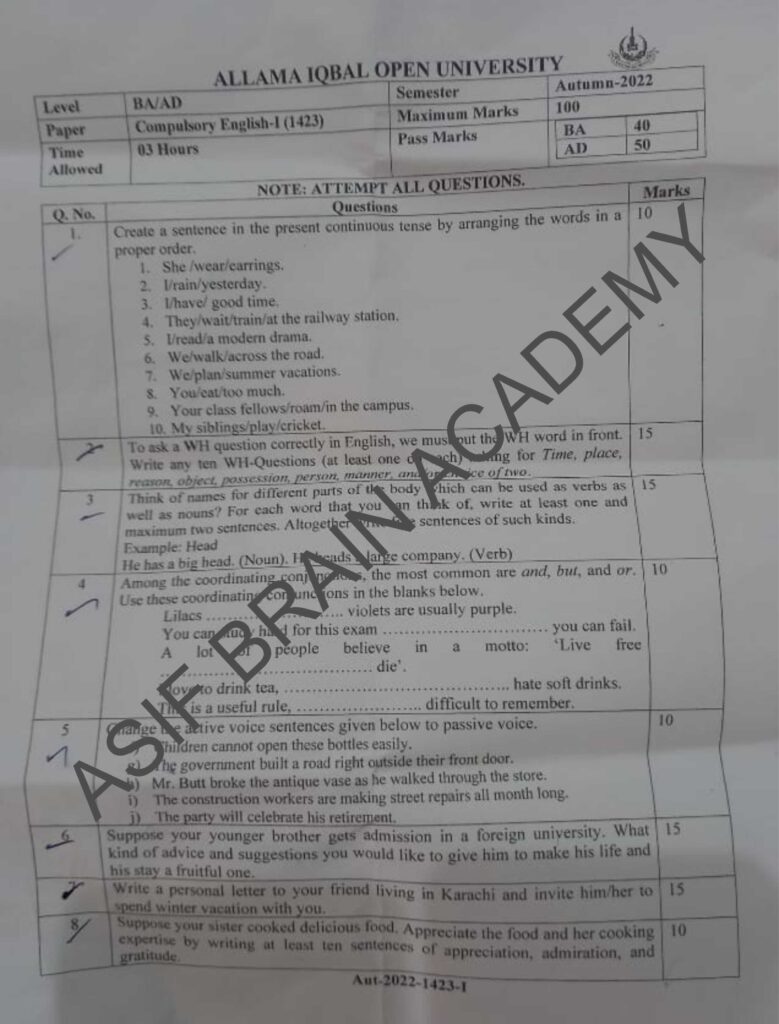AIOU 1423 Code Solved Paper Autumn 2022 – Compulsory English-I
Prepare yourself thoroughly for the AIOU 1423 Code Solved Paper Autumn 2022 – Compulsory English-I . This comprehensive solved paper offers detailed solutions to all the questions that appeared in the Autumn 2022 examination, helping students familiarize themselves with the exam structure and question types. It covers essential components such as grammar exercises, comprehension, vocabulary, and essay writing, making it an excellent tool for BA, ADP, and BS students aiming to enhance their language skills and secure better grades. Using this solved paper will boost your confidence and improve your exam readiness by providing clear and precise answers.
For access to more solved papers, guess papers, and valuable study materials for various AIOU courses across BA, AD, and BS programs, visit mrpakistani.com. Also, subscribe to our YouTube channel Asif Brain Academy for step-by-step video tutorials, assignment help, and the latest exam updates.

| 1423 Code Solved Paper Autumn 2022 | |
|---|---|
| Level | BA/BS |
| Semester | Autumn 2022 |
| Subject/Course Code | Compulsory English-I (1423) |
| Maximum Marks | 100 |
| Pass Marks | BA: 40 /AD: 50 |
| Medium of Instruction | Compulsory English I |
| ATTEMPT Only Five QUESTIONS | |
AIOU 1423 Code Solved Paper Autumn 2022 – Compulsory English-I
Create a sentence in the present continuous tense by arranging the words in a proper order.
1. She / wear / earrings.
→ She is wearing earrings.
2. I / rain / yesterday.
→ I am walking in the rain. (Note: “Yesterday” refers to the past, but for present continuous tense, we assume a present context.)
3. I / have / good time.
→ I am having a good time.
4. They / wait / train / at the railway station.
→ They are waiting for the train at the railway station.
5. I / read / a modern drama.
→ I am reading a modern drama.
6. We / walk / across the road.
→ We are walking across the road.
7. We / plan / summer vacations.
→ We are planning summer vacations.
8. You / eat / too much.
→ You are eating too much.
9. Your class fellows / roam / in the campus.
→ Your class fellows are roaming in the campus.
10. My siblings / play / cricket.
→ My siblings are playing cricket.
To ask a WH question correctly in English, we must put the WH word in front. Write any ten WH-Questions (at least one each for Time, Place, Reason, Object, Possession, Person, Manner, and two others).
1. Time: What time do you usually wake up in the morning?
2. Place: Where do you live in Pakistan?
3. Reason: Why didn’t you attend the class yesterday?
4. Object: What are you looking for in your bag?
5. Possession: Whose book is lying on the table?
6. Person: Who is your favorite teacher?
7. Manner: How did you solve that difficult question so quickly?
8. Frequency: How often do you visit your grandparents?
9. Quantity: How many students are there in your class?
10. Purpose: What is the purpose of this assignment?
Think of names for different parts of the body which can be used as verbs as well as nouns. For each word that you can think of, write at least one and maximum two sentences. Altogether sentences of such kinds.
Example: Head
He has a big head. (Noun)
He heads a large company. (Verb)
1. Hand
He injured his hand while playing. (Noun)
Please hand me the book. (Verb)
2. Face
She has a beautiful face. (Noun)
We must face the challenges bravely. (Verb)
3. Finger
His finger was hurt during the game. (Noun)
Don’t finger other people’s belongings. (Verb)
4. Eye
She has green eyes. (Noun)
The security guard eyed the stranger suspiciously. (Verb)
5. Elbow
He has pain in his elbow. (Noun)
He elbowed his way through the crowd. (Verb)
6. Mouth
He opened his mouth to speak. (Noun)
Don’t mouth the words during the test. (Verb)
7. Shoulder
She tapped him on the shoulder. (Noun)
He shouldered the responsibility of his family. (Verb)
8. Tongue
He bit his tongue during dinner. (Noun)
He tongued the candy into his cheek. (Verb)
9. Leg
He broke his leg in the accident. (Noun)
The dog legged it across the yard. (Verb – informal/slang usage meaning “ran”)
10. Nose
Her nose is very sharp. (Noun)
Don’t nose around in other people’s business. (Verb)
Among the coordinating conjunctions, the most common are and, but, and or.
Use these coordinating conjunctions in the blanks below.
Lilacs ………….. violets are usually purple.
You can for this exam…………….. you can fail.
A lot of people believe in a motto: ‘Live free …………….. die’.
I love to drink tea, ……….. hate soft drinks.
It is a useful rule, ……………… difficult to remember.
1. Lilacs and violets are usually purple.
2. You can pass this exam or you can fail.
3. A lot of people believe in a motto: ‘Live free or die’.
4. I love to drink tea, but hate soft drinks.
5. It is a useful rule, but difficult to remember.
Change the active voice sentences given below to passive voice.
a) Children cannot open these bottles easily.
b) The government built a road right outside their front door.
c) Mr. Butt broke the antique vase as he walked through the store.
d) The construction workers are making street repairs all month long.
e) The party will celebrate his retirement.
f) Suppose your younger brother gets admission.
a) These bottles cannot be opened easily by children.
b) A road was built right outside their front door by the government.
c) The antique vase was broken by Mr. Butt as he walked through the store.
d) Street repairs are being made all month long by the construction workers.
e) His retirement will be celebrated by the party.
f) Suppose admission is granted to your younger brother.
Suppose your younger brother gets admission in a foreign university. What kind of advice and suggestions would you like to give him to make his life and his stay a fruitful one?
1. First and foremost, always keep your faith and trust in Allah. Pray regularly to seek guidance and strength throughout your journey.
2. Manage your time wisely between studies and personal life. Prioritize your academic responsibilities to make the most out of your education.
3. Be open to learning new cultures and traditions. Respect the local customs and interact with people from diverse backgrounds to enrich your experience.
4. Stay connected with family and friends back home through calls and messages, but also focus on building a strong support network in the university.
5. Take good care of your health by eating balanced meals, exercising regularly, and getting enough rest to maintain both physical and mental well-being.
6. Always ask questions and seek help from professors and peers when you find difficulties in your studies. Never hesitate to use university resources such as libraries and counseling centers.
7. Budget your finances carefully. Avoid unnecessary expenses and save money where possible to ensure you can meet all your needs comfortably.
8. Participate in extracurricular activities, clubs, or volunteer work to develop new skills and create a well-rounded university experience.
9. Learn the language of the host country if it is different from your own; this will help you communicate better and feel more integrated.
10. Lastly, always remember to uphold your values, stay honest, and work hard with patience and determination. Success comes with effort and trust in Allah’s plan.
Write a personal letter to your friend living in Karachi and invite him/her to spend winter vacation with you.
Dear [Friend’s Name],
I hope this letter finds you in the best of health and spirits. As the winter season is approaching, I am writing to warmly invite you to spend your winter vacation here with me. It would be a wonderful opportunity for us to catch up and create unforgettable memories.
Our city during winter is truly beautiful, with cool weather and serene mornings. I have planned some exciting activities for us, including visits to the local parks, delicious food outings, and maybe even a short trip to nearby scenic places.
It will also give you a break from the hectic life in Karachi and a chance to relax in a peaceful environment. You can enjoy the calm winter evenings here and spend quality time with my family as well.
Please let me know your travel plans as soon as possible so I can make all the necessary arrangements for your stay. I am really looking forward to your visit and I promise you will have a fantastic time.
Take care of yourself and write back soon.
Your loving friend,
[Your Name]
Suppose your sister cooked delicious food. Appreciate the food and her cooking expertise by writing at least ten sentences of appreciation, admiration, and gratitude.
1. Sister, your cooking today was absolutely delicious and mouth-watering.
2. Every dish you prepared was full of rich flavors and perfectly cooked.
3. I admire your skill and dedication in the kitchen; it truly shows.
4. Your food brought joy and comfort to everyone at the table.
5. The aroma of your cooking filled the whole house with warmth and happiness.
6. You have a natural talent for blending spices and creating wonderful tastes.
7. Thank you for putting so much effort and love into preparing this meal.
8. Your cooking has made this day special and memorable for all of us.
9. I am grateful to have such a talented and caring sister like you.
10. Keep up the amazing work; your cooking is truly a gift for the family.















